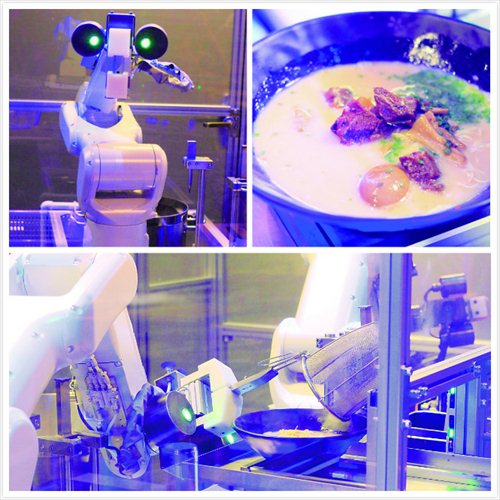Robotic ramen
Automated noodle chefs provide a taste of the future in Shanghai
At the end of a noodle shop, a pair of robotic hands are at work. One boils ramen while the other is in charge of picking up the bowl, pouring out the correct amount of soup and adding the pre-cooked toppings.
The eyes of the owners of these hands twinkle as their mouths mutter intelligible words.
This is not a scene from the latest sci-fi movie, but the kitchen in Shanghai's first robotic ramen shop, which opened little more than a week ago.
The Global Times visited the shop and talked with its owner, Liu Jin.
Liu lived in Japan for decades. In the early years he studied classical music and was engaged in logistics and management.
It was not until he visited an exhibition on robots in Japan five years ago that his interest in robotic catering was sparked.
Liu said he got the idea to combine robots and catering because of the grim situation in the catering industry.
"In the first half of 2015, the talent gap in the catering industry reached 10 million. We have been looking for several months to recruit four waiters," Liu told the Global Times.
"Using robots is a trend in the catering industry."
The robots can cook four kinds of ramen - braised beef, beef, fish fillet, and seafood. They can make a bowl of ramen in an average 90 seconds.

Robotic hands at work to cook a bowl of ramen (upper right) Photos: Qi Xijia/GT
Problems solved
According to Liu, robots will solve the shortage of staff in the industry, and have the advantage of never getting tired and never quitting their job.
"They can do what humans can't do. Their hands can make a 360-degree turn. They can cover all corners," said Liu.
Although he spent over 1 million yuan ($154,047) on his two robots, which he imported from Japan, he believes they will turn out cheaper than employing people in the long run.
"As the market size for robots grows, they will become cheaper, just as cellphones did," said Liu.
"If there is a standard recipe, there is nothing a robot can't do. It can cook Chinese food as easily as cooking a hamburger in McDonald's, following easy and repetitive steps," said Liu.
"Give it a recipe, and it will cook food better than a human can."
The main problem is that the robots lack the initiative and adaptability of human staff. But Liu believes it won't be a problem in the future.
"As an industry, efficiency always comes first. You need to make food with a high price-quality ratio within a short time," said Liu.
He gives sushi as an example. "A cook who makes good sushi will eventually age and die, and it is difficult to pass his skills on to other people as the quality of sushi is dependent on the body temperature on the palm, which differs from person to person. I think maybe one day robots can inherit the skill and achieve individuality."
Future threat
While Liu doesn't deny that robot cooks will impact on human cooks, he doesn't think the latter are necessarily under threat.
"If it were easy to employ a cook at a reasonable piece who will stick to his/her job, people wouldn't develop robots to do the task. They were created in response to the skills gap in the catering industry, and will in turn bring some changes to the industry," said Liu.
"I think in future, robots can do the work of a cook while the cook can pursue what robots can't do, for example they can develop a better recipe, and seek out ingredients. Some of them may even cooperate with the programmer to develop better robot cooks. Their work will be totally different from now," said Liu.
Having lived in Japan for decades where robots are widely used in many industries, Liu said he hadn't seen people get unemployed as a result. On the contrary, he said people work more efficiently and in a relaxed manner.
"I think robots will be the next breakthrough after the Internet. In the future, many things will be done by robots, which will bring a huge change to the lives of human beings," said Liu.
Liu said people are curious and zealous about the robot cooks. His guests include regular diners, people from the catering industry, and engineers from the robot industry who want to see the robots from overseas in action.
In the future, Liu plans to introduce bartending and ice-shaving robots.